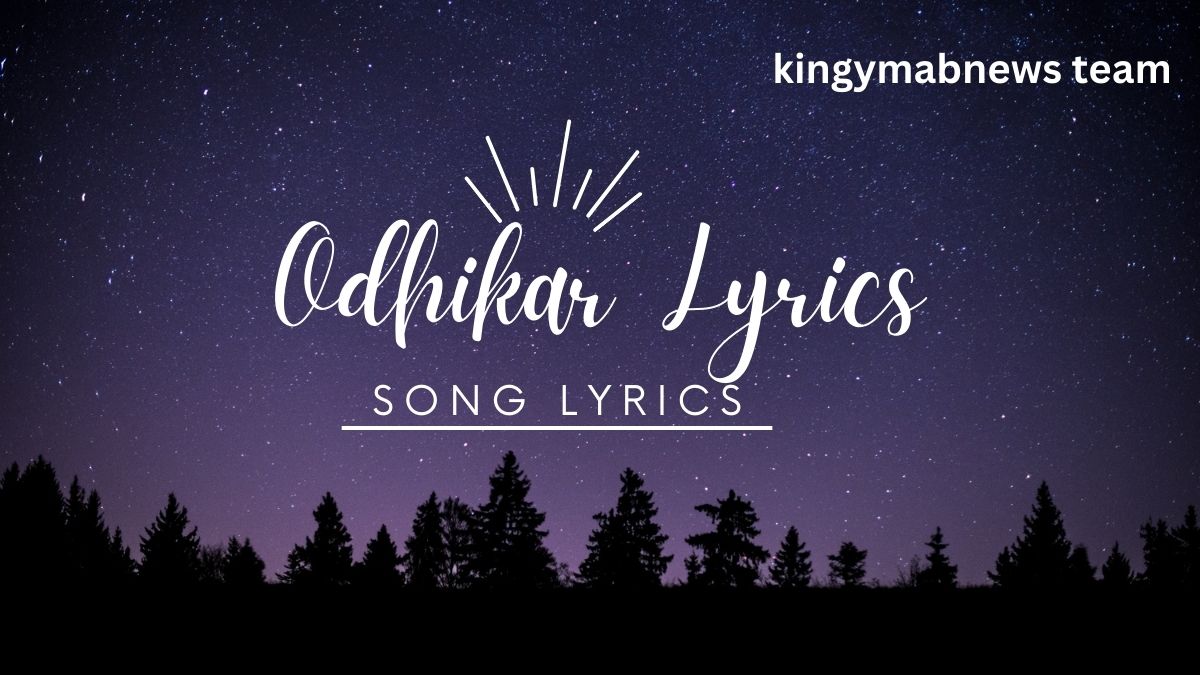The song Odhikar with its powerful lyrics and stirring melody, has resonated with audiences around the world. In this article, we delve into the meaning and significance of the lyrics of “Odhikar,” unraveling the message it conveys and the impact it has had on listeners.
Background of Odhikar
Odhikar lyrics which translates to “Rights” in English, is a song that addresses the theme of justice, equality, and human rights. The lyrics are thought-provoking and poignant, reflecting on the struggles faced by individuals in society and the call for justice and freedom.
Analyzing the Lyrics
The lyrics of Odhikar delve into various aspects of human rights, touching upon issues such as discrimination, inequality, and oppression. The song emphasizes the importance of standing up for one’s rights and advocating for justice in the face of adversity.
Key Themes in the Lyrics
– Equality and Justice: The lyrics of Odhikar highlight the universal principles of equality and justice, calling for a society where all individuals are treated fairly and with respect.
– Freedom and Empowerment: The song underscores the significance of freedom and empowerment, urging listeners to assert their rights and resist any form of oppression.
– Solidarity and Unity: Odhikar promotes the idea of solidarity and unity among individuals, emphasizing the collective struggle for justice and human rights.
Impact of Odhikar
The lyrics of Odhikar have had a profound impact on listeners, inspiring them to reflect on the state of human rights in society and motivating them to take action to uphold justice and Equality. The song serves as a reminder of the importance of advocating for human rights and standing up against injustice.
Song Odhikar lyrics
“Ki korchho?
— “Ei toe, baire giyechhilam ektu, ekhon boi porchhi.”
“Kothay kothay ghurle aaj ?”
“Ramna Park-ei katiyechhi bela 3 ta theke 6 ta porjonto.”
— “O maa, tumi Ramna Park-eo jao naki.”
— “Na, tobe aaj monta khub kharap lagchhilo, bhablam ektu ghure
— “Taa ki ki korle shakhane.”
— “Dolany dulechhi.”
— “Bolo kii, tumi dolnay dulecho!”
— “Haa Shababa, tomar kachhe ajob mone hobe. Tumi phone rakho, ami call back korchhi.” — “Tomar kono kichhui amar kachhe aajkaal ahob mone hoy na, tumi kemon jeno hoye
jachchho din din.’ Amin call back kortei Shababa phoen dhorlo. Dr. Amin Ahmad Chaudhury-r bandhobi Shababa. Boyoshe bistor farak, tobuo bondhutto-ta jomechhe bhaloi. Edaning ei bondhutto niye Dr. Chaudhury-r office-e besh kana ghusha cholchhe. Tobu-o jeno dujoner karur-ee kono porwa nei. Ekjon onyojoner shahochorjo enjoy kore khub.
— “Shono Shabby, mon dye shunbe.”
“Ei, amake Shabby bolbe na. Do I look shabby ?”
shonachchhe ar manush gol hoye dariye dariye shunchhe ar heshe kuti kuti hochchhe. Ektu dariye okhan theke shore elam. Ektu dure dolnay koyekta meye dulchhe ar koyekte0
meye dariye dekhchhe. Pala kore dulchhe ora. Kache gelam. Ekta meye koto hobe
boyosh maximum 15, kalo meye. Lal ekta kameez ar nil salwar pora. Orna-tao lal.
Porichchhonno, kintu iron kora hoy ni. Shorir ekhono temon fute otheni, curvegulo tem on
shotej noy. Bujhai jachchhe opushtite bhugchhe. Khub jore dulchhe, nana bhongim ay.
Oshadharon dokkhotay dariye boshe shuye dulchhe. Dolna ta 45 theke 135 degree arc
chhui chhui korchhe. Ami dekhchhi toe dekhchhiii.
Hotath amar mone holo mey etao amake dekhchhe. Thoter kone hashir jholok dekha
jachchhe. Ami bujhe niyechhi era kara. Dhire dhire goti komlo dolnar. Tham lo meyeti, amar
dike cheye bollo, — “dulben?”
Kichhu na bole ami shoe khule fellam. Darano ekta meyer shamne shoe-ta rekhe bollam, —
“Ektu dekhe rakhbe, churi hoye gele khali paaye ghore firte hobe.” Heshe uthlo shobgulo
meye. Ami dolnar dike egiye jatei meyeti shore jate chailo. Ami bollam, — “Jabe na, tomake
niyei dulbo.” Thom ke darlo meyeti, shara chokhe mukhe bishmoyer chhap sposhto.
Bollam, — “Dolnay otho.” Montro mugdho manusher moto dolanay uthlo meyeti. Amio or
shamna sham ni daralam. Ami shikol dhortei o haat baralo. Bollam, ” Na, tumi shikol
dhorbe na” Obak holo o. Bollo -” Pore jabo toe.” Bollam, — “Na, porbe na, tumi amake
joriye dhore rakho.” Uchchhol hashi charpashe. Darano meyegulo hashchhe. Dolnar meyeti
amar mukher dike cheye ache. Bollam, “Ko holo, dhoro amake.” O dhorche na dekhe ami
or du haat dhore amar pither du pashe joriye diye bollam, – dhore rahkho,” bolei dolnay
payer chap dilam. Dolna dule uthtei ebar o amake thikee joriy e dhorlo.
ashi. Tai jawa.”
— ” Bolbona, ekhon shono. Shokal thekei monta bhalo jachchhilo na. Breakfast-o korini. 2 tar dike ber holam, kono gontobyo nei. Hotath mone holo Ramna Parker dike jai. Onek din odike jawa hoy na. Ramnay pouchalam 3 ta bajeni tokhono. Parke tem on lokjon nei. Cholte cholte dekhi ek jaygay besh bhir. Kache jeye dekhi okhane char pachta chhele
read more exciting news about entertainment and lyrical contents
FAQ’S abot odhokar lyrics
1. What is the meaning of the word Odhikar?
Odhikar translates to “Rights” in English. The odhikar lyrics delve into the themes of justice, equality, and human rights.
2. What inspired the creation of the song Odhikar?
The song Odhikar was inspired by the struggles faced by individuals in society and the call for justice and freedom.
3. Are there any specific historical or cultural references in the Odhikar lyrics?
The lyrics of Odhikar draw upon universal themes of equality, justice, and empowerment, making it relevant to audiences across cultures.
4. How have listeners responded to Odhikar lyrics?
The lyrics of Odhikar have resonated with audiences around the world, inspiring reflection on human rights issues and motivating individuals to stand up for justice.
5. Is there a specific message or moral lesson conveyed through the lyrics of Odhikar?
The lyrics of Odhikar emphasize the importance of advocating for human rights, standing up against injustice, and promoting solidarity and unity among individuals.
Conclusion about Odhikar lyrics
Odhikar is not just a song—it is a powerful anthem that speaks to the struggles and aspirations of individuals seeking justice and equality. Through its poignant lyrics and emotive melody, Odhikar continues to resonate with audiences, reminding us of the enduring significance of human rights and the importance of fighting for justice and freedom.














+ There are no comments
Add yours